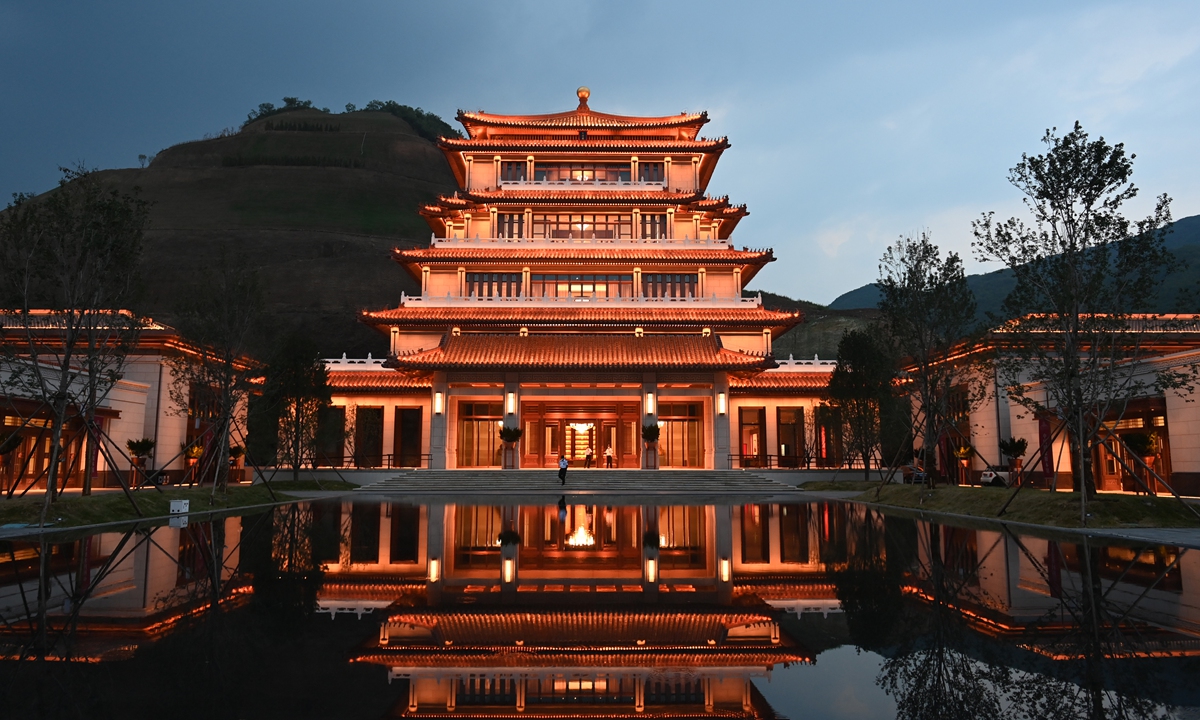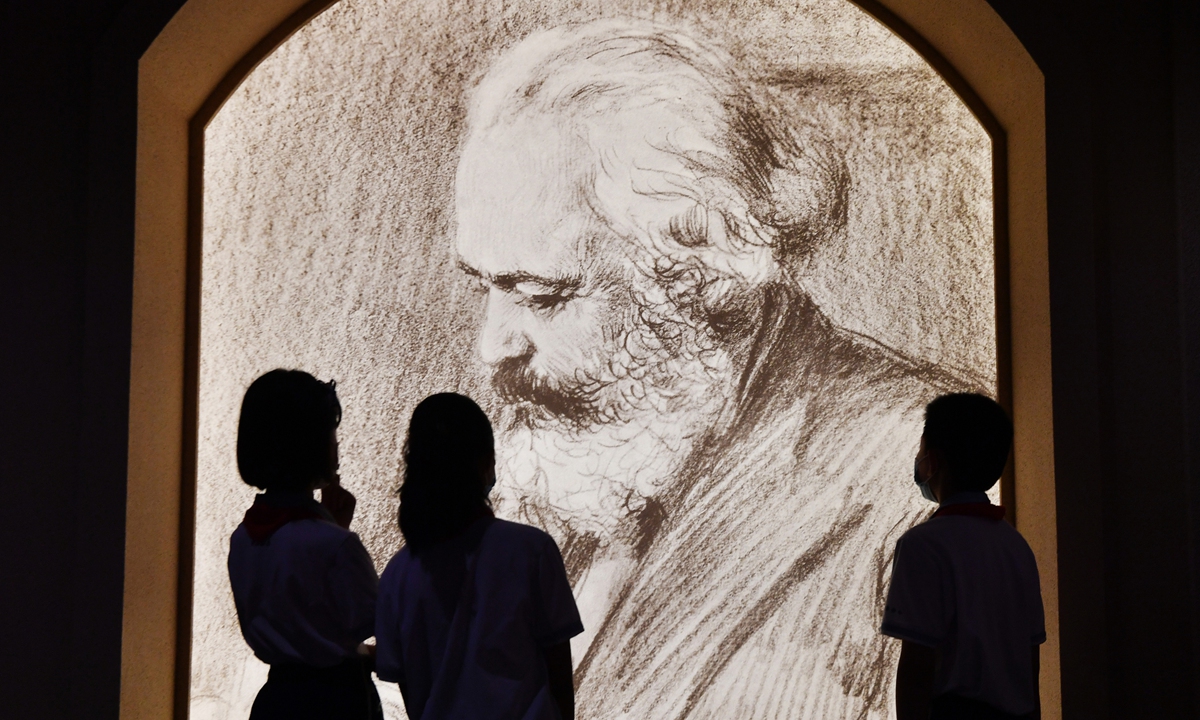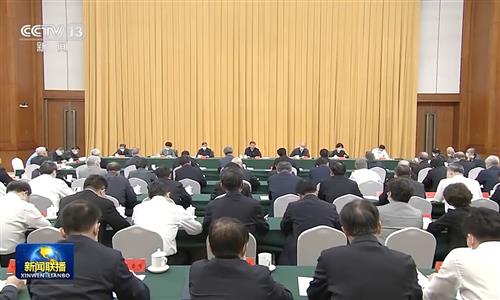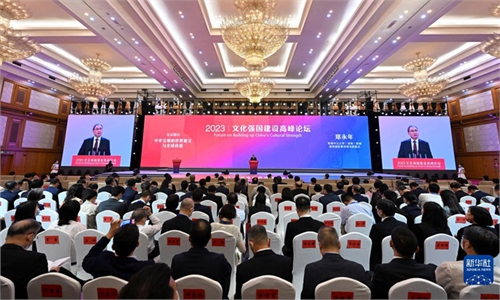IN-DEPTH / IN-DEPTH
From tradition to modernization: Ancient, brilliant Chinese culture works with Marxist tenets to secure civilization’s future
Editor's Note:
Chinese President Xi Jinping highly values culture and has a profound understanding of culture.
To him, culture plays a unique and irreplaceable role in the rejuvenation of China and the building of a global community of shared future. He speaks from Chinese wisdom, which has been passed down for millennia, advocates for the mutual prosperity of global civilizations, welcomes the flourishing of popular cultural products, and encourages the youth to join the path to inheriting and reinventing their proud traditions.
The second issue of the Xivilization series focuses on Xi's call for preserving and inheriting the brilliant, ancient Chinese civilization, and how the traditional culture and Marxism combine to contribute to building Chinese modernization.

"With unwavering cultural confidence, a profound sense of mission, and a spirit of relentless endeavor, we must unite our efforts to create a new culture for our times," said Chinese President Xi Jinping at a meeting on cultural inheritance and development on June 2.
The cultural missions in the new era are to further advance cultural prosperity, build a leading country in culture, and foster the modern Chinese civilization, said Xi, also general secretary of the Communist Party of China (CPC) Central Committee and chairman of the Central Military Commission.
During the latest, unprecedented inspections and meetings, Xi also pointed out the path to achieving the mission.
Before the meeting, Xi visited the China National Archives of Publications and Culture (CNAPC) and the Chinese Academy of History. During the inspection of the CNAPC in the northern suburbs of Beijing, Xi toured the exhibition halls and expressed his concern for the invaluable classic publications that have endured the vicissitudes of time.
Publications and cultural articles preserve and transmit traditional Chinese culture, symbolizing and testifying to the splendor of the Chinese civilization since its ancient beginnings. Described as a cultural "seed bank" that records China's glorious culture and folk wisdom, the archives contain more than 16 million copies of historical texts and printed materials.
Xi emphasized the institution's primary responsibility of collection, while also encouraging it to strengthen the research on collected items, to contribute to carrying forward the only ancient civilization without interruption.
Inside the Chinese Academy of History, he visited the Chinese Archaeological Museum in the academy and toured exhibitions including one on the origins of the Chinese civilization. Xi highlighted the integral role of archaeology in deepening the understanding of the rich and profound Chinese culture. He emphasized the significance of conducting research and providing interpretations regarding the origins of the Chinese civilization.
Prominent features of Chinese civilization chart the path of progress
From President Xi's remarks during the meeting, it is clear that the prominent features of the ancient Chinese civilization have charted the path of historical development of the Chinese nation.
At the meeting on cultural inheritance and development, Xi summarized five prominent features regarding the Chinese civilization - consistency, originality, uniformity, inclusivity, and peaceful nature.
Xi emphasized that the Chinese civilization has a long and continuous history stretching back to antiquity, and said that a comprehensive and profound understanding of that history is essential to promoting the creative transformation and development of fine traditional Chinese culture more effectively, and to developing the modern Chinese civilization.
As prominent features of the Chinese civilization, its consistency determines, on a fundamental level, that the Chinese people must follow their own path, and its originality determines the enterprising spirit of the Chinese people.
Probably no one has a deeper understanding of Xi's remarks on the consistency and other features of the Chinese civilization than Wang Wei, director of the Chinese Academy of Social Sciences' Academic Division of History, who attended the meeting. Wang has undertaken the national Project to Trace the Origins of Chinese Civilization for decades.
"These five features are very comprehensive, systematic, and profound," Wang told the Global Times.
"Each feature can be cited with much archaeological and historical evidence, supported by the national project to trace the origins of the Chinese civilization," he said.
The consistency of the Chinese civilization, for example, can be seen from four focused archaeological sites including the Liangzhu site in Hangzhou, East China's Zhejiang Province, the Erlitou site in Luoyang, Central China's Henan Province, the Taosi site in Linfen, North China's Shanxi Province, and the Shimao site in Shenmu, Northwest China's Shaanxi Province from between 3500BC and 1500BC, and other major city ruins from this period along the Yangtze, Yellow, and Liaohe rivers, according to Wang.
Only by understanding the consistency of Chinese civilization can we understand the fundamental level that "the Chinese people must follow their own path," and understand that the path of socialism with Chinese characteristics is the only path for the Chinese nation to become prosperous and strong, he noted.
The unity of Chinese civilization determines fundamentally that the various ethnic cultures of the Chinese nation are integrated and rally closely together, even when faced with major setbacks, and that a strong and unified country is the pillar upon which the well-being of all Chinese people depends, President Xi said.
Xing Guangcheng, head of the Institute of Chinese Borderland Studies at the Chinese Academy of Social Sciences, told the Global Times that he was very impressed by Xi's speech while attending the meeting.
China's long history shows that various ethnic groups in our country were linked with and had frequent exchanges with others, gradually forming a community of shared future. The Chinese nation has a fine tradition of patriotism since ancient times, and all ethnic groups made every effort to safeguard the homeland. The modern history of the Chinese nation fighting against foreign invasion and saving the country can be a good example, Xing said.
The inclusiveness of the Chinese civilization has been demonstrated in various research and archeology findings, Wang Wei told the Global Times. For example, the cultivation of wheat, the breeding of cattle, and the metallurgy native to West Asia, were introduced to ancient China more than 4,500 years ago. China then developed its own brilliant ceremonial civilization with bronze ware. At the same time, the cultivation of rice and millet native to China also spread to West Asia and other regions.
President Xi went on to say that the inclusivity of the Chinese civilization determines the harmonious coexistence of diverse religious beliefs in China, and determines the open-minded and inclusive mentality toward various civilizations around the world. Its peaceful nature demonstrates that China will continue to pursue exchanges and mutual learning with different civilizations rather than cultural hegemony, and that China will not impose its own values and political system on others but will promote cooperation rather than confrontation or creating exclusive blocs.
The five prominent features are "the latest summary and refinement of the overall characteristics of the Chinese civilization by General Secretary Xi in the new era," Wang Xuebin, a professor at the Party School of the CPC Central Committee (National Academy of Governance), told the Global Times. Once again, it fully shows that "the CPC Central Committee does have a very deep grasp and concern for research on the Chinese civilization and its great significance."

Natural integration with Marxist tenets
Marxism provided the spiritual guidance of the Communist Party of China for over a century from the revolution years to the construction period. Since the founding of the People's Republic of China, especially since the reform and opening-up, China has continuously accumulated economic and social development achievements, all in the process of the Sinicization of Marxism.
Xi stressed that it is natural to integrate the basic tenets of Marxism with China's specific realities and fine traditional culture if we are to create and develop socialism with Chinese characteristics on the basis of the profound Chinese civilization of more than 5,000 years.
No matter from theoretical research and practical experiences, "this integration has guided us from one success to another and has become the most important tool to us," said Wang Xuebin, also chief expert of the Party School's "Chinese Civilization and Chinese Road Research" project.
During the implementation of the project to trace the origins of Chinese civilization, Wang Wei's team adhered to Marxist's view that "a country is the generalization of a civilized society," so that they could break the shackles of the theory of the West and recognize the Chinese approach to decide the standard of a civilized society. This standard also made a contribution to the study of global civilization.
Experts and scholars in the relevant fields said that under the guidance of the speech by Xi, efforts should be made to shoulder the new mission of further promoting cultural prosperity and developing a modern Chinese civilization from a new starting point.
"President Xi gave a very clear explanation on the relationship of the Chinese civilization, the construction of socialist culture, and the construction of modern civilization of the Chinese nation. Only by understanding China from its long-standing historical consistency can we better understand China and clarify the direction of the future development of our country," Wang Wei said.
Xi calls for integration of the basic tenets of Marxism with China's specific realities and fine traditional culture
First, compatibility is the prerequisite for integration. Although Marxism and fine traditional Chinese culture have different origins, they are highly compatible with each other. Compatibility facilitates integration.
Second, the result of the integration is mutual benefit, giving rise to a unified new culture that enables Marxism to become Chinese, and fine traditional Chinese culture modern. The newly minted culture through integration has become the cultural form of the Chinese path to modernization.
Third, the integration solidifies the foundation of the path of socialism with Chinese characteristics, providing it with broader and deeper historical depth and enriching its cultural basis. Chinese modernization invigorates Chinese civilization with modern power, while Chinese civilization supports Chinese modernization with cultural sustenance.
Fourth, the integration has opened up space for innovation and helped us maintain the initiative in our ideological and cultural work, exerting a powerful influence on our path, theory and system. What is more important is that integrating the basic tenets of Marxism with China's fine traditional culture means another effort to emancipate our minds, which makes it possible for us to make full use of the precious resources of fine traditional Chinese culture in broader cultural space in exploring theoretical and institutional innovation for the future.
Fifth, the integration has consolidated the principal role of culture, with the establishment of the Thought on Socialism with Chinese Characteristics for a New Era being the most vivid example.
Chinese President Xi Jinping highly values culture and has a profound understanding of culture.
To him, culture plays a unique and irreplaceable role in the rejuvenation of China and the building of a global community of shared future. He speaks from Chinese wisdom, which has been passed down for millennia, advocates for the mutual prosperity of global civilizations, welcomes the flourishing of popular cultural products, and encourages the youth to join the path to inheriting and reinventing their proud traditions.
The second issue of the Xivilization series focuses on Xi's call for preserving and inheriting the brilliant, ancient Chinese civilization, and how the traditional culture and Marxism combine to contribute to building Chinese modernization.

China National Archives of Publications and Culture in Beijing Photo: VCG
"With unwavering cultural confidence, a profound sense of mission, and a spirit of relentless endeavor, we must unite our efforts to create a new culture for our times," said Chinese President Xi Jinping at a meeting on cultural inheritance and development on June 2.
The cultural missions in the new era are to further advance cultural prosperity, build a leading country in culture, and foster the modern Chinese civilization, said Xi, also general secretary of the Communist Party of China (CPC) Central Committee and chairman of the Central Military Commission.
During the latest, unprecedented inspections and meetings, Xi also pointed out the path to achieving the mission.
Before the meeting, Xi visited the China National Archives of Publications and Culture (CNAPC) and the Chinese Academy of History. During the inspection of the CNAPC in the northern suburbs of Beijing, Xi toured the exhibition halls and expressed his concern for the invaluable classic publications that have endured the vicissitudes of time.
Publications and cultural articles preserve and transmit traditional Chinese culture, symbolizing and testifying to the splendor of the Chinese civilization since its ancient beginnings. Described as a cultural "seed bank" that records China's glorious culture and folk wisdom, the archives contain more than 16 million copies of historical texts and printed materials.
Xi emphasized the institution's primary responsibility of collection, while also encouraging it to strengthen the research on collected items, to contribute to carrying forward the only ancient civilization without interruption.
Inside the Chinese Academy of History, he visited the Chinese Archaeological Museum in the academy and toured exhibitions including one on the origins of the Chinese civilization. Xi highlighted the integral role of archaeology in deepening the understanding of the rich and profound Chinese culture. He emphasized the significance of conducting research and providing interpretations regarding the origins of the Chinese civilization.
Prominent features of Chinese civilization chart the path of progress
From President Xi's remarks during the meeting, it is clear that the prominent features of the ancient Chinese civilization have charted the path of historical development of the Chinese nation.
At the meeting on cultural inheritance and development, Xi summarized five prominent features regarding the Chinese civilization - consistency, originality, uniformity, inclusivity, and peaceful nature.
Xi emphasized that the Chinese civilization has a long and continuous history stretching back to antiquity, and said that a comprehensive and profound understanding of that history is essential to promoting the creative transformation and development of fine traditional Chinese culture more effectively, and to developing the modern Chinese civilization.
As prominent features of the Chinese civilization, its consistency determines, on a fundamental level, that the Chinese people must follow their own path, and its originality determines the enterprising spirit of the Chinese people.
Probably no one has a deeper understanding of Xi's remarks on the consistency and other features of the Chinese civilization than Wang Wei, director of the Chinese Academy of Social Sciences' Academic Division of History, who attended the meeting. Wang has undertaken the national Project to Trace the Origins of Chinese Civilization for decades.
"These five features are very comprehensive, systematic, and profound," Wang told the Global Times.
"Each feature can be cited with much archaeological and historical evidence, supported by the national project to trace the origins of the Chinese civilization," he said.
The consistency of the Chinese civilization, for example, can be seen from four focused archaeological sites including the Liangzhu site in Hangzhou, East China's Zhejiang Province, the Erlitou site in Luoyang, Central China's Henan Province, the Taosi site in Linfen, North China's Shanxi Province, and the Shimao site in Shenmu, Northwest China's Shaanxi Province from between 3500BC and 1500BC, and other major city ruins from this period along the Yangtze, Yellow, and Liaohe rivers, according to Wang.
Only by understanding the consistency of Chinese civilization can we understand the fundamental level that "the Chinese people must follow their own path," and understand that the path of socialism with Chinese characteristics is the only path for the Chinese nation to become prosperous and strong, he noted.
The unity of Chinese civilization determines fundamentally that the various ethnic cultures of the Chinese nation are integrated and rally closely together, even when faced with major setbacks, and that a strong and unified country is the pillar upon which the well-being of all Chinese people depends, President Xi said.
Xing Guangcheng, head of the Institute of Chinese Borderland Studies at the Chinese Academy of Social Sciences, told the Global Times that he was very impressed by Xi's speech while attending the meeting.
China's long history shows that various ethnic groups in our country were linked with and had frequent exchanges with others, gradually forming a community of shared future. The Chinese nation has a fine tradition of patriotism since ancient times, and all ethnic groups made every effort to safeguard the homeland. The modern history of the Chinese nation fighting against foreign invasion and saving the country can be a good example, Xing said.
The inclusiveness of the Chinese civilization has been demonstrated in various research and archeology findings, Wang Wei told the Global Times. For example, the cultivation of wheat, the breeding of cattle, and the metallurgy native to West Asia, were introduced to ancient China more than 4,500 years ago. China then developed its own brilliant ceremonial civilization with bronze ware. At the same time, the cultivation of rice and millet native to China also spread to West Asia and other regions.
President Xi went on to say that the inclusivity of the Chinese civilization determines the harmonious coexistence of diverse religious beliefs in China, and determines the open-minded and inclusive mentality toward various civilizations around the world. Its peaceful nature demonstrates that China will continue to pursue exchanges and mutual learning with different civilizations rather than cultural hegemony, and that China will not impose its own values and political system on others but will promote cooperation rather than confrontation or creating exclusive blocs.
The five prominent features are "the latest summary and refinement of the overall characteristics of the Chinese civilization by General Secretary Xi in the new era," Wang Xuebin, a professor at the Party School of the CPC Central Committee (National Academy of Governance), told the Global Times. Once again, it fully shows that "the CPC Central Committee does have a very deep grasp and concern for research on the Chinese civilization and its great significance."

Students pay respects to the portrait of Karl Marx at the Marxist study and practice base in Qingdao, East China's Shandong Province on September 22, 2022 Photo: VCG
Natural integration with Marxist tenets
Marxism provided the spiritual guidance of the Communist Party of China for over a century from the revolution years to the construction period. Since the founding of the People's Republic of China, especially since the reform and opening-up, China has continuously accumulated economic and social development achievements, all in the process of the Sinicization of Marxism.
Xi stressed that it is natural to integrate the basic tenets of Marxism with China's specific realities and fine traditional culture if we are to create and develop socialism with Chinese characteristics on the basis of the profound Chinese civilization of more than 5,000 years.
No matter from theoretical research and practical experiences, "this integration has guided us from one success to another and has become the most important tool to us," said Wang Xuebin, also chief expert of the Party School's "Chinese Civilization and Chinese Road Research" project.
During the implementation of the project to trace the origins of Chinese civilization, Wang Wei's team adhered to Marxist's view that "a country is the generalization of a civilized society," so that they could break the shackles of the theory of the West and recognize the Chinese approach to decide the standard of a civilized society. This standard also made a contribution to the study of global civilization.
Experts and scholars in the relevant fields said that under the guidance of the speech by Xi, efforts should be made to shoulder the new mission of further promoting cultural prosperity and developing a modern Chinese civilization from a new starting point.
"President Xi gave a very clear explanation on the relationship of the Chinese civilization, the construction of socialist culture, and the construction of modern civilization of the Chinese nation. Only by understanding China from its long-standing historical consistency can we better understand China and clarify the direction of the future development of our country," Wang Wei said.
Xi calls for integration of the basic tenets of Marxism with China's specific realities and fine traditional culture
First, compatibility is the prerequisite for integration. Although Marxism and fine traditional Chinese culture have different origins, they are highly compatible with each other. Compatibility facilitates integration.
Second, the result of the integration is mutual benefit, giving rise to a unified new culture that enables Marxism to become Chinese, and fine traditional Chinese culture modern. The newly minted culture through integration has become the cultural form of the Chinese path to modernization.
Third, the integration solidifies the foundation of the path of socialism with Chinese characteristics, providing it with broader and deeper historical depth and enriching its cultural basis. Chinese modernization invigorates Chinese civilization with modern power, while Chinese civilization supports Chinese modernization with cultural sustenance.
Fourth, the integration has opened up space for innovation and helped us maintain the initiative in our ideological and cultural work, exerting a powerful influence on our path, theory and system. What is more important is that integrating the basic tenets of Marxism with China's fine traditional culture means another effort to emancipate our minds, which makes it possible for us to make full use of the precious resources of fine traditional Chinese culture in broader cultural space in exploring theoretical and institutional innovation for the future.
Fifth, the integration has consolidated the principal role of culture, with the establishment of the Thought on Socialism with Chinese Characteristics for a New Era being the most vivid example.





